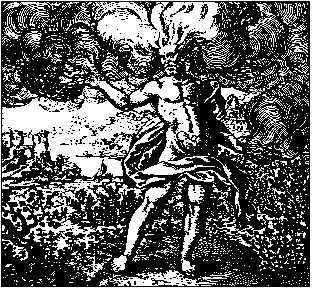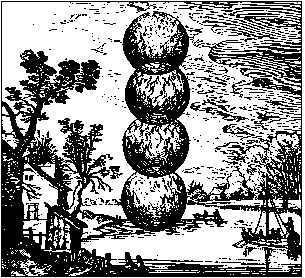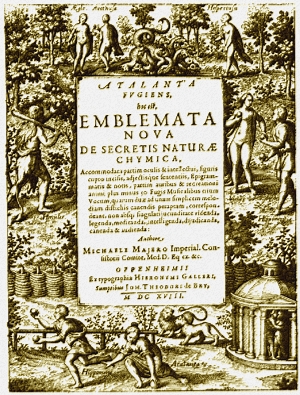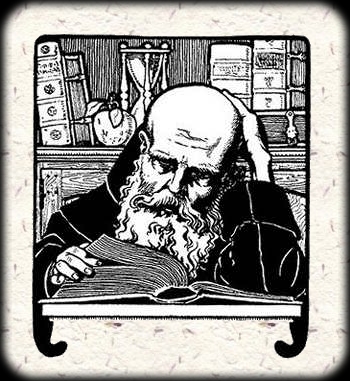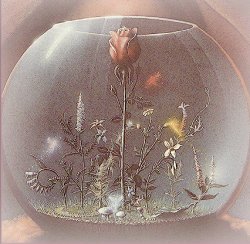The First
Multimedia Production?
Renaissance Alchemist
Michael Maier's
Atalanta FugiensAtalanta Fugiens may well be one of the first multimedia prductions ever created . The work was created in 1617, by Renaissance alchemist Michael Maier.
The complete title is Atalanta fugiens, hoc est, emblemata nova de secretis naturae chymica. The publication is a complex early example of multimedia art made up of 50 sections. Each section contains an engraved emblem and has a verse and an epigram associated with the emblem, and a short prose discourse which elaborates an alchemical interpretation of the symbolism in the emblem. Each of the 50 sections also includes a short musical piece composed by Maier.
Maier also composed 2 pieces called Rosicrucian canons.
We have transcribed and arranged the music from the original multi-part notation of Atalanta Fugiens into standard modern notation, as well as transcribing the music into both keyboard and guitar notation.
See below to listen to MP3 samples and
information about purchasing any of these collections.
About Michael Maier
Michael Maier (1566-1622)
Michael Maier was an alchemist, physician, and a hermetic philosopher and was affiiliated with the Rosicrucians. He was a contemporary and an associate of many famous hermetic philosophers and alchemists such as Robert Fludd. Michael Maier during his life was an accomplished writer, diplomat, physician, poet, and classical scholar. He was born at Rendsburg, educated at the University of Rostock, and later received his doctorate of medicine at Basel. He lived for many years in Prague as physician and confidant of the Emperor Rudolf II, an important patron of the arts, who had an special interest in hermetic philosophy and goals.
The early Rosicrucian movement was deeply involved with alchemy. While it has often been dismissed by modern scientists as nothing but an somewhat primitive precursor to chemistry which dealt with the naive idea of transmuting base metals into gold, alchemy in its most profound sense was, in fact, a highly sophisticated system which dealt with a quest for spiritual transformation and awareness through the application of the universal processes of nature on all conceivable levels-- physical, psychological and spiritual: a process that was known as (and still is known today by those who pursue it) the "Great Work".
Maier was the author of numerous alchemical and Rosicrucian works, many illustrated with symbolic engravings of great beauty. These include Arcana Arcanissima (1614), Lusus Serius (1616), De Circulo Physico Quadrato (1616), Atalanta Fugiens (1617), Examen Fucorum Pseudo-Chymicum (1617), Jocus Severus (1617), Silentium Post Clamores (1617), Symbola Aurea Mensae Duodecim Nationum (1617), Themis Aurea (1618), Tripus Aureus (1618), Viatorum (1618), Tractatus de Volucri Arborea (1619), Verum Inventum (1619), Septimana Philosophica (1620), Civitas Corporis Humani (1621), Cantilenae Intellectuales de Phoenice Redivivo (1622), Ulysses (posth., 1624) and Subtilis Allegoria super Secreta Chymiae (posth., 1749).
MP3 Samples of Atalanta Fugiens
This will give you an idea of the various arrangements
that can be created using the music transcriptions below
For keyboard:
Atalanta - 1
Atalanta - 2
Atalanta - 12
For choir
Atlanta 10
Atalanta 27
For harp:
Atalanta 10
Atalanta 20
For synthesizer
Atalanta 13
Atalanta 42
For Organ
Atalanta 17
Atalanta 30
Atalanta Fugiens
Music NotationThis is a PDF file that contains the original multi-part pieces in modern music notation.
After your credit-card or Paypal payment is processed, you will be immediately emailed the download link .
Atalanta Fugiens Music Notation - $5.00
New - Atalanta Fugiens
Keyboard and Guitar
TranscriptionsThese 2 PDF files contain the 50 Atalanta pieces
transcribed for both keyboard and fingerstyle guitar
(both notation and guitar tablature included).
After your credit-card or Paypal payment is processed, you will be immediately emailed the download link .
Atalanta Fugiens
Keyboard Transcriptions - $5.00
Atalanta Fugiens
Guitar Transcriptions - $5.00
The Atalanta Fugiens Screensaver
This is a Windows screensaver with the emblems of the entire original Atalanta Fugiens manuscript. The price is $2.00, and you can purchase the screensaver using the following link.
After making a secure Paypal or Credit Card payment you will be immediately directed to the download link.
After you download the screensaver, place the screensaver file in the directory where your screensavers are stored. On some Windows systems such as XP, you can also right click on the file and choose install.
If you have any questions, contact us by e-mail.
Robert Fludd, also known as Robertus de Fluctibus (17 January 1574 – 8 September 1637), was a prominent English physician with both scientific and occult interests. He is remembered as an astrologer, mathematician, cosmologist, Qabalist and an early Rosicrucian apologist.
There is an old manusript that contains a piece of music attributed to Robert Fludd..... we have transcribed that piece and offer the original 3-part music as well as a piano and guitar transcription.
Listen to MP3 samples at:
including the music of the spheres, the music of a Renaissance alchemist, music created by software and artificial intelligence, the music of the fairies, the music of the Illuminati, the world's most mysterious book, the world's oldest song, a way you can compose music like Mozart, the world's oldest love song,
and much more........
© 2013 - Amaranth Publishing
All rights reserved
